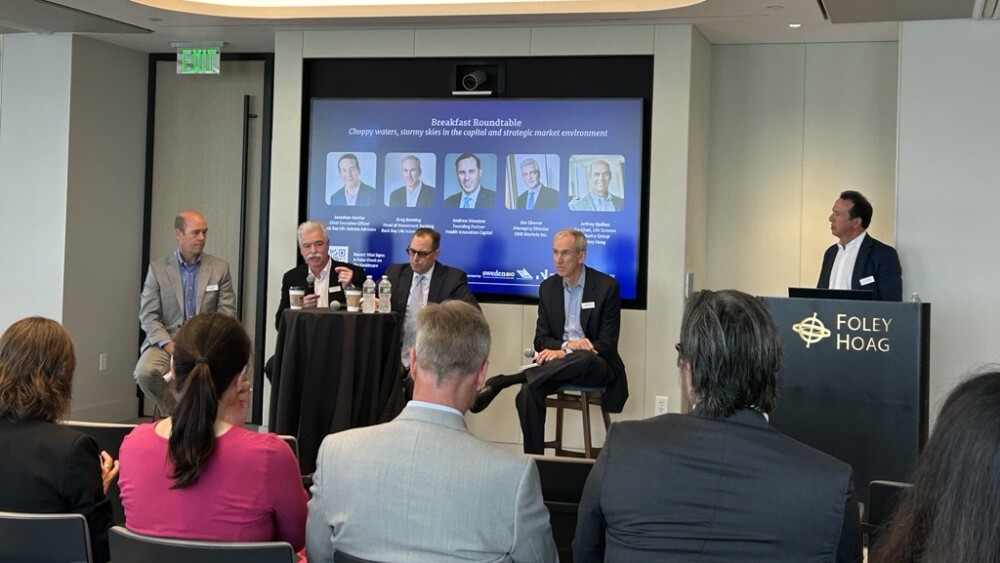| |
CAMBRIDGE, Mass., Dec. 7, 2020 /PRNewswire/ -- Synlogic, Inc. (Nasdaq: SYBX), a clinical stage company bringing the transformative potential of synthetic biology to medicine, today announced that it will present additional translational and in silico data on SYNB8802, a Synthetic Biotic medicine for the treatment of Enteric Hyperoxaluria, during the American Institute of Chemical Engineers (AIChE) 3rd International Conference on Microbiome Engineering (ICME) on December 7-9, 2020.
Synlogic's presence will include:
- Presentation by Mark Charbonneau, Head of Quantitative Biology
Title: Development of a Synthetic Biotic for the Treatment of Enteric Hyperoxaluria
- Poster by Nick Horvath, Computational Scientist
Title: In silico Simulation to Predict Activity of a Synthetic Biotic, SYNB8802, in Healthy Volunteers and Patients with Enteric Hyperoxaluria
Additionally, Tim Lu, Synlogic co-founder and MIT Associate Professor of Biological Engineering and Electrical Engineering and Computer Science, will deliver a keynote address on synthetic biology for microbiome engineering.
SYNB8802 is currently in Phase 1 clinical studies which began in November of this year. The Phase 1 clinical study has two parts: Part A is a multiple ascending dose study in healthy volunteers; Part B is a placebo controlled, cross-over design study in patients with Enteric Hyperoxaluria following Roux-n-Y gastric bypass surgery. SYNB8802 will be assessed for safety and tolerability, and the potential to reduce urinary oxalate. Synlogic anticipates data from the study will be available in 2021.
Learn more about Synlogic's programs and pipeline by visiting https://www.synlogictx.com/.
About Enteric Hyperoxaluria
Enteric Hyperoxaluria (HOX) is an acquired metabolic disorder caused by increased absorption of dietary oxalate, which is present in many common foods including leafy greens, nuts, and chocolate. Enteric Hyperoxaluria often occurs as a result of a primary insult to the bowel, such as inflammatory bowel disease, Crohn's disease, short bowel syndrome, or as a result of surgical procedures such as Roux-en-Y bariatric weight-loss surgery.
Enteric Hyperoxaluria results in dangerously high levels of urinary oxalate, which causes progressive kidney damage, kidney stone formation, and nephrocalcinosis. There are an estimated 250,000 patients with Enteric Hyperoxaluria in the United States. Enteric Hyperoxaluria has no approved treatment options.
About Synlogic
Synlogic™ is bringing the transformative potential of synthetic biology to medicine. With a premiere synthetic biology platform that leverages a reproducible, modular approach to microbial engineering, Synlogic designs Synthetic Biotic medicines that target validated underlying biology to treat disease in new ways. Synlogic's proprietary pipeline includes Synthetic Biotics for the treatment of metabolic disorders including Phenylketonuria (PKU) and Enteric Hyperoxaluria (HOX). The company is also building a portfolio of partner-able assets in immunology and oncology.
Forward-Looking Statements
This press release contains "forward-looking statements" that involve substantial risks and uncertainties for purposes of the safe harbor provided by the Private Securities Litigation Reform Act of 1995. All statements, other than statements of historical facts, included in this press release regarding strategy, future operations, clinical development plans, future financial position, future revenue, projected expenses, prospects, plans and objectives of management are forward-looking statements. In addition, when or if used in this press release, the words "may," "could," "should," "anticipate," "believe," "estimate," "expect," "intend," "plan," "predict" and similar expressions and their variants, as they relate to Synlogic may identify forward-looking statements. Examples of forward-looking statements, include, but are not limited to, statements regarding the potential of Synlogic's platform to develop therapeutics to address a wide range of diseases including: cancer, inborn errors of metabolism, and inflammatory and immune disorders; the future clinical development of Synthetic Biotic medicines; the approach Synlogic is taking to discover and develop novel therapeutics using synthetic biology; and the expected timing of Synlogic's clinical trials and availability of clinical trial data. Actual results could differ materially from those contained in any forward-looking statement as a result of various factors, including: the uncertainties inherent in the clinical and preclinical development process; the ability of Synlogic to protect its intellectual property rights; and legislative, regulatory, political and economic developments, as well as those risks identified under the heading "Risk Factors" in Synlogic's filings with the SEC. The forward-looking statements contained in this press release reflect Synlogic's current views with respect to future events. Synlogic anticipates that subsequent events and developments will cause its views to change. However, while Synlogic may elect to update these forward-looking statements in the future, Synlogic specifically disclaims any obligation to do so. These forward-looking statements should not be relied upon as representing Synlogic's view as of any date subsequent to the date hereof.
 View original content:http://www.prnewswire.com/news-releases/synlogic-presents-synb8802-for-enteric-hyperoxaluria-at-the-american-institute-of-chemical-engineers-conference-on-microbiome-engineering-301187531.html View original content:http://www.prnewswire.com/news-releases/synlogic-presents-synb8802-for-enteric-hyperoxaluria-at-the-american-institute-of-chemical-engineers-conference-on-microbiome-engineering-301187531.html
SOURCE Synlogic, Inc.
|
|




